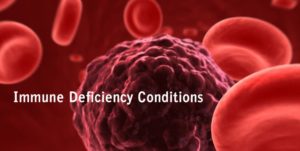Immune deficiencies are serious health conditions that can render individuals more susceptible to infections, resulting in both more frequent and more severe infections. Primary immune deficiencies are typically genetic but sometimes may not manifest until adulthood. Secondary immune deficiencies are acquired and are most often due to medications that suppress the immune system or infections such as HIV that affect immune function.
Overview of Primary Immune Deficiencies
 The human immune system is extremely complex and has several different elements that work together to provide a multi-layered defense against infections from viruses, bacteria, and other dangerous pathogens. Defects with one part of the immune system may be subtle or severe depending on which part of the immune system is affected and the significance of any functional defect.
The human immune system is extremely complex and has several different elements that work together to provide a multi-layered defense against infections from viruses, bacteria, and other dangerous pathogens. Defects with one part of the immune system may be subtle or severe depending on which part of the immune system is affected and the significance of any functional defect.
B-cells are specialized immune cells that produce antibodies, which protect against infection. A defect within the B-cell can lead to decreased antibody production and/or decreased antibody function. Individuals with one of these disorders may have increased or more severe sinus or lung infections. Some of these disorders can also lead to increased risk for gastrointestinal infections and autoimmune conditions. The most common B-cell immune deficiency, IgA deficiency, may not require active treatment, but individuals are at increased risk for developing more severe immune problems including autoimmune disorders as they age. Common variable immune deficiency and other more severe B-cell deficiencies can be life-threatening however and generally require ongoing lifelong treatment with antibody replacement (IVIG or SCIG, see below). While these disorders are considered hereditary, they may not manifest or be recognized until adulthood in some cases.
T-cells are also specialized immune cells that directly attack cells infected with viruses and they act as regulators of the immune system. Primary T-cell immune deficiencies are less common than B-cell disorders and often occur as part of a complex genetic condition called DiGeorge Syndrome (22q11.2 deletion syndrome) that is typically diagnosed soon after birth due to associated heart disease and problems caused by low calcium levels. Routine newborn screening in Texas should now catch most individuals with severe T-cell immune deficiencies. Individuals with some T-cell disorders may need to avoid live viral vaccines and may need preventive antibiotics in some cases. Children with more severe T-cell disorders may require bone marrow or stem cell transplants or thymus transplants if they are diagnosed with DiGeorge syndrome.
 Combined immune deficiencies include some of the most severe immune deficiencies and affected individuals can have compromised B and T-cell dysfunction. These disorders are usually fatal if not diagnosed and treated early in childhood. Fortunately, most infants with these conditions will be identified with routine newborn screening in Texas, leading to earlier treatment and better outcomes than in years past. Children with these conditions are typically treated with bone marrow or stem cell transplants, but gene therapy treatments may also be an option for some in the future.
Combined immune deficiencies include some of the most severe immune deficiencies and affected individuals can have compromised B and T-cell dysfunction. These disorders are usually fatal if not diagnosed and treated early in childhood. Fortunately, most infants with these conditions will be identified with routine newborn screening in Texas, leading to earlier treatment and better outcomes than in years past. Children with these conditions are typically treated with bone marrow or stem cell transplants, but gene therapy treatments may also be an option for some in the future.
Phagocytic disorders are immune deficiencies characterized by a decreased ability of white blood cells to kill bacterial and fungal pathogens in the skin, lungs and other organs. These immune deficiencies lead to severe, recurrent, debilitating infections that are often life threatening. Due to the type and severity of infections these disorders are often diagnosed in early childhood. Treatment may include bone marrow transplant and preventive antibiotics. Gene therapy may also be an option for some of these conditions in the future.
Complement disorders are deficiencies of proteins in our blood and tissues that recognize and tag bacteria and other infectious agents in our blood. Individuals who do not make enough of one of these proteins may be more susceptible to certain types of bacterial infections and may be more likely to develop autoimmune conditions. Once a diagnosis is made, patients are typically given vaccines to protect against the types of infections that are most concerning in these patients.
Diagnosis of Primary Immune Deficiencies
If you or a family member has problems with recurrent infections, it may be appropriate to see an immunologist to determine if an underlying immune problem could be a contributing factor. In many cases patients may have low antibody levels to common bacteria that can be boosted with routine vaccination, potentially reducing the frequency of bacterial respiratory infections. If there is a true primary immune deficiency, an immunologist can help recommend appropriate treatment and referrals when appropriate.
Immunoglobulin Replacement
Patients with immune disorders that affect antibody (immunoglobulin) production or function may require treatment with immunoglobulin G (IgG) infusions. IgG can be collected from healthy donors and then given to individuals with low IgG levels or function to increase their resistance to infection. IgG can be intravenously (IVIG) or subcutaneously (SCIG). In many cases patients who need this treatment can be trained to self-administer their medication at home. Depending on patient preference, the medication is given as often as once a week or up to once a month. As the disorders that require IgG replacement are incurable, this treatment is usually lifelong, under the close supervision of an immunologist.
All of our physicians at North Texas Allergy & Asthma Center are allergists and immunologists that are board certified in both allergy and immunology by the American Board of Allergy and Immunology. We are highly proficient in detecting, diagnosing and treating immune disorders. If you or a loved one has a problem with recurrent infections or has been diagnosed with an immune deficiency, we would welcome the opportunity to help you.
SAMUEL FOSTER, MD
Board Certified Allergist







